When it comes to the stakes involved in today’s Iraq “withdrawal,” so far discussion has focused on the implications for the U.S. project in Iraq. But the outcome, as reflected in the security situation over the next six months, will have regional repercussions as well, because we’re currently applying variations of the same nation-building model we’ve used in Iraq around the Middle East and South Asia. The most obvious example is Afghanistan, and there’s overlap with what we’re pressuring Pakistan to do in the FATA. But there’s also the U.S. involvement in training Palestinian security forces in the West Bank. […]
Asia-Pacific Archive
Free Newsletter
Looks like I wasn’t the only one to scratch my head about the eagerness to condemn what transpired in Honduras as an anti-democratic, extral-legal military coup. Jason Steck, writing at RCW’s The Compass, tries to clear things up: What both sides miss is that a “coup” isn’t always extralegal. In short, what is happening in Honduras may be an example of a coup that is not only legal, but mandatory. The oddness of this concept to American minds requires an explanation. [. . .] . . . [S]ome countries explicitly endow their military with a role inmaintaining democratic governance. . […]
As much as NATO coalition partners’ contribution to the Afghanistan War has been criticized over the years, it bears noting that as long as the war is a multilateral effort, Russia can’t hold negotiations over supply routes entirely hostage to its bilateral spats with the U.S. That said, the fact that the tone out of Moscow regarding supply routes in general has been pretty conciliatory of late suggests to me that Russia was authentically on board with the Kyrgyz government’s decision to renew the Manas lease. That reflects the fact that the last thorny irritant left over from the Bush […]
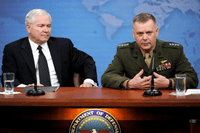
Back before the Iraq surge, “military operations other than war” — a now-antiquated term referring to non-traditional warfare — were treated as “lesser includeds,” filed deep under subsections of big-war plans, doctrine, and acquisition strategies. Today, by contrast, the U.S. national security establishment is increasingly embracing what I like to call the “greater inclusive” paradigm, which recognizes our military’s rising quotient of such operations, not as some rare exception, but rather as the new rule. Thanks to Iraq and now Afghanistan-Pakistan, the military no longer assumes that any force constructed and trained for big wars can automatically handle the “other […]

With Thailand posting a 17-year record drop in exports for the first quarter of 2009, and the economy shrinking by 7.1 percent as a consequence, the global downturn is clearly causing severe problems for some one-time stellar performers. Like its Tiger Economy counterparts, Malaysia and Singapore, Thailand’s exports account for a majority of the country’s economic activity — more than 60 percent in Thailand’s case. Ultimately, these countries depend heavily on Western consumers buying the products they make, or the ones they make components for, depending on the particular industry and local position in the globalized manufacturing chain. Given their […]
DILI, East Timor — Little over a year after declaring his intent to launch an anti-corruption commission, East Timor’s Prime Minister Xanana Gusmao has been hit with renewed graft allegations, this time by ABC Australia. The story claims that Gusmao’s daughter is a shareholder in Prima Foods, a company that received a $3.5 million food-importing contract signed off on by the PM. In what is regarded as Asia’s poorest country per capita, oil revenues excluded, food security remains a pressing issue for many Timorese in rural areas. The annual “hunger season” in the early months of the year, when there […]
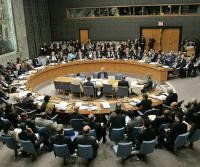
Like beauty, the value of the United Nations lies in the eye of the beholder. Case in point, David Rothkopf’s recent screed on ForeignPolicy.com against the world’s largest multilateral organization, the latest in a long line of vitriolic — and largely misinformed — attacks on the institution. Only a few years ago, John Bolton, at the time the U.S. ambassador to the body, declared that lopping 10 floors off the secretariat would make little difference in its operation. Superfluous or not, those 10 floors managed to survive Bolton’s U.N. tenure largely unscathed. Although Rothkopf’s rant, too, will likely dissolve away […]
According to Defense News, the only real change at the Manas base supplying the Afghanistan war will be in its name: instead of calling it an air base, it will now be called an transit corridor. Besides the nomenclature, though, the military activities, mainly basing tankers for refueling missions, will continue. According to RIA Novosti, Russia’s okay with the sleight of hand, with President Dmitry Medvedev calling the “transit center” a contribution to the fight against the joint terrorist threat. The fact that the lease was only extended for a year strongly suggests we haven’t heard the last of this. […]
Joshua Foust highlights the disconnect between the public COINspeak surrounding Gen. Stanley McChrystal’s appointment to run the Afghanistan war and the private KILLspeak surrounding his appointment to run the Afghanistan war: [W]hile publicly McChrystal says everything rightabout being population-centric and all that, very few, and I mean thisseriously, VERY few of the groundpounders within USFOR-A are gettingexcited about finally executing a proper counterinsurgency. Instead,all the excitement is about “finally” being able to “take the fight tothe enemy,” “now we get to kick some ass,” and similar sentiments. In other words, at least a large number of soldiers, both within andwithout […]
Alex Evans, writing at Global Dashboard, flags the declines in net private capital flows to emerging markets as a form of hidden protectionism: These are precipitous declines — and the reason that theyconstitute protectionism is because developed country policymakers havebeen putting pressure on their banks to curtail to poorer countries,which are seen as riskier investments. Meanwhile, Le Monde flags the rising “Buy Chinese” sentiment in China, as domestic firms vie with foreign competitors for economic stimulus contracts: At the same time that foreign groups counted on the significant infrastructure spending anticipated in the government’s stimulus plan, a dozen state agencies […]
So in the end, Kyrgyzstan’s threat to close the Manas air base we’ve been using to supply the Afghanistan war effort was just a bargaining ploy. A successful one, at that, since it almost quadrupled the yearly lease we’re paying, while apparently rolling back the terms to now include the transit of only non-military supplies. (Question: What are we going to shoot at the bad guys in Afghanistan once we can’t ship in any ammo anymore?) Some folks might read this as a U.S. victory over Russian meddling. But the fact that the terms of the lease have now been […]
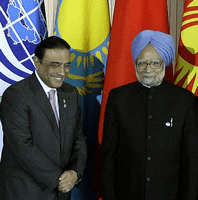
ISLAMABAD, Pakistan — The leaders of Pakistan and Indian recently agreed to restart the stalled “peace” process between the two countries. Known as the “Composite Dialogue,” the talks were suspended after the Mumbai terrorist attacks in November 2008, which India blamed on Pakistan-based militant outfits, primarily Lashkar-e-Tayyaba (LeT). India, however, has limited the focus of any future talks between foreign secretaries to the issue of cross-border terrorism, thereby limiting optimism about their chances of success as well. Indian Prime Minister Manmohan Singh and Pakistani President Asif Ali Zardari agreed to resume the Composite Dialogue during a meeting on the sidelines […]
Relations between Cambodia and Thailand will be sorely tested this week, with Bangkok expected to ask UNESCO to review its decision to list the 11th-century temple of Preah Vihear as a world heritage site. Thai Prime Minister Abhisit Vejjajiva has ordered Thailand’s representative to the World Heritage Committee to object to the 2008 listing of the Angkorian temple when the committee meets for its 33rd session in Seville, Spain. According to the Thai News Agency, Thailand will protest on the grounds that the listing has brought about conflict and losses between the two countries, running counter to UNESCO’s aim in […]
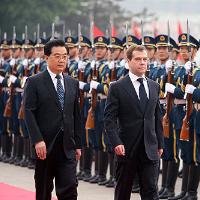
Chinese and Russian leaders meet frequently, but last week was special. President Hu Jintao of China and President Dmitry Medvedev of Russia conferred three times over the course of four days — at the June 15-16 Shanghai Cooperation Organization summit in Yekaterinburg, then later on June 16 at the first-ever heads-of-state meeting of the BRIC countries (Brazil, Russia, India, and China), and again afterwards when Hu made a state visit to Moscow from June 16-18. Hu’s visit helped mark the 60th anniversary of the establishment of diplomatic relations between Moscow and Beijing. It coincided with the signing of over 40 […]
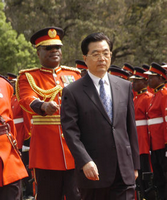
China’s rapid rise as a global economic power was brought into sharp relief during the March 2009 G-20 finance ministers meeting when, for the first time, pundits speaking about the event used the label “G-2” to signal that the world — economically speaking — now had two contending powers: China and the United States. China’s rise has, in turn, sparked enormous interest in its development model and the contrast that presents to much of the “Washington Consensus” on development policy. At the same time, the Chinese have sharply increased their foreign assistance, most visibly in Sub-Saharan Africa, after a lull […]
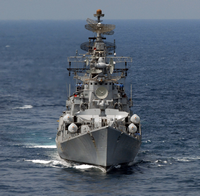
NEW DELHI — Most of the attention given to India’s big defense modernization program, valued at more than $50 billion, has focused on the $11-billion fighter jet contract that New Delhi is looking to sign. However, concerned by the threat from the seas, especially in the wake of the Mumbai terror attacks in November, India has been looking to build its naval strength as well. In a recent move, the federal government has also designated the Indian navy as the nodal authority responsible for overall maritime security, which includes coastal and offshore security. Last week, India approved its biggest-ever domestic […]
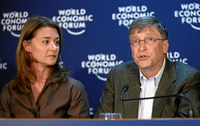
Foundations are stepping up their engagement in Sub-Sahara Africa. But will that fundamentally alter the dynamics on the ground? When Warren Buffett donated $30 billion to the Bill and Melinda Gates Foundation a few years ago, many observers heralded the arrival of a new age of private philanthropy in the Carnegie and Rockefeller tradition. Particular attention has been paid in recent years to the growing engagement of philanthropic foundations in international development, and especially in Sub-Saharan Africa. Enthusiasts have pointed out that foundations offer a new and significant source of financing for development, with the potential to outstrip official development […]
